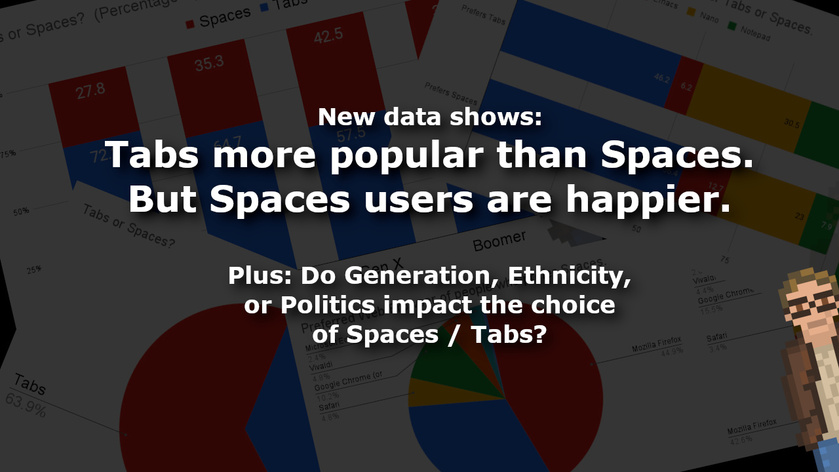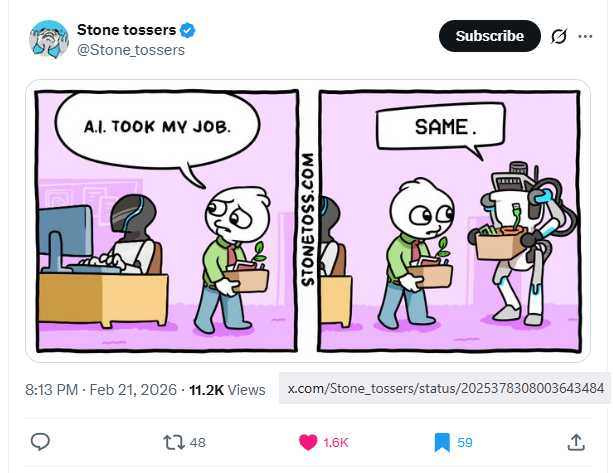"Tabs vs Spaces" is a debate as old as... well... Tabs and Spaces. Lots of opinions. Lots of arguments.
But which method of indentation do most computer nerds (and others within the IT industry) actually prefer?
And, while we're on the subject, are there any correlations between Tabs/Spaces usage... and a persons preferred Operating System, Web Browser, or Text Editor? How about age, politics, and ethnicity? Do those influence the Tabs or Spaces preference? Are people who use Tabs happier than people who use Spaces?
I know some of that may sound crazy... but... do you know the answer? Now that you've thought about it... don't you want to know?
The Lunduke Journal set out to answer these questions (and so many others) by surveying 7,200 IT professionals and computer nerds. (More information on the survey at the end of this article.)
And now, we can difinitively say, we have those answers.
Yes. People prefer Tabs.
This is about as conclusive as it gets. 63.9% prefer Tabs over Spaces.
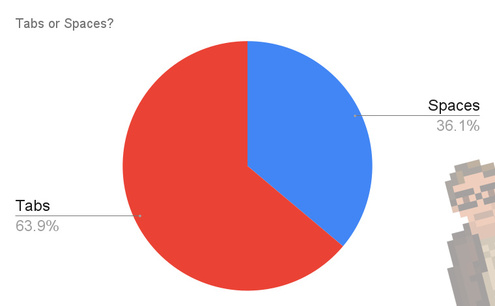
Sure. Most people perfer Tabs... but that still leaves a heck of a lot of questions unanswered.
Tabs / Spaces vs Text Editors
Do people who prefer Tabs... prefer Emacs or Vi? Do "Spaces People" prefer editors like Notepad and Nano?
We presented those surveyed with four options: Emacs, Vi, Nano, & Notepad. They had to chose one. Here's how it broke down (according to those who preferred either Tabs or Spaces).
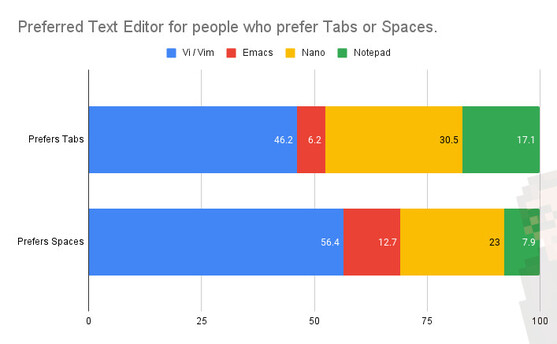
First of all: Vi / Vim were clearly the most popular. But especially among those who prefer Spaces.
And people who like Tabs? They tend to stay clear of Emacs... and gravitate towards Nano and Notepad.
Seriously. The numbers don't lie.
Tabs / Spaces vs Operating Systems
But, wait. Tabs and Notepad go hand-in-hand? Say what?
Let's dive deeper... and take a look at how the Tabs / Spaces division plays out for each of the three major Operating Systems.
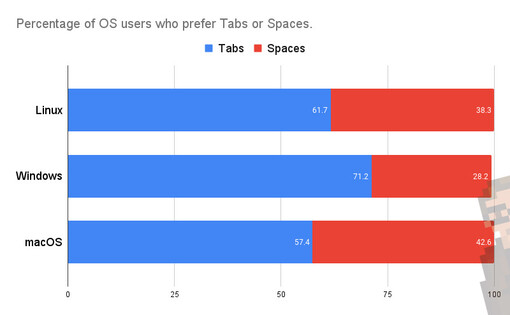
Windows users are, overwhelmingly, the biggest fans of Tabs. 71.2%.
macOS users, on the other hand, still prefer Tabs... but to a far less extreme degree (57.4% vs 42.6%).
Linux users fell somewhere in the middle.
Just the same... users of every major Operating System prefer Tabs. Decisively.
Tabs / Spaces vs Web Browsers
While we're looking at correlations between software usage and Tabs / Spaces... let's look at Web Browsers.

A few little take-aways.
- Tabs aficionados like Google Chrome a bit more (15.5% vs 10.2%).
- Ironically, Spaces users like Microsoft Edge a tad more. Which is funny, considering how much Windows users tend to prefer Tabs.
Ok. Let's move into the non-software correlations.
Tabs / Spaces vs Age
Which generation (X, Millenial, etc.) prefers Spaces vs Tabs? Turns out, there's a distinct difference between the age groups.
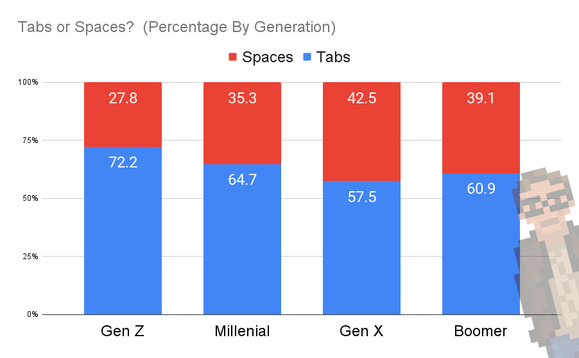
Gen Z (1997 - 2012), is all Tabs. 72.2%.
But Gen X (1965 - 1980)? They're far more split. 57.5% for Tabs, 42.5% for Spaces.
If there's one Generation keeping "Spaces" alive... it's Gen X. Gen X might as well be renamed to "Gen Spaces".
Tabs / Spaces vs Politics
Now, how about political leanings? I mean, seriously... it would be kinda interesting to know if politics had any correlation with a persons preference for using Spaces or Tabs.
Does it matter? No. But now that I've mentioned it... you kinda want to know too, don't ya?
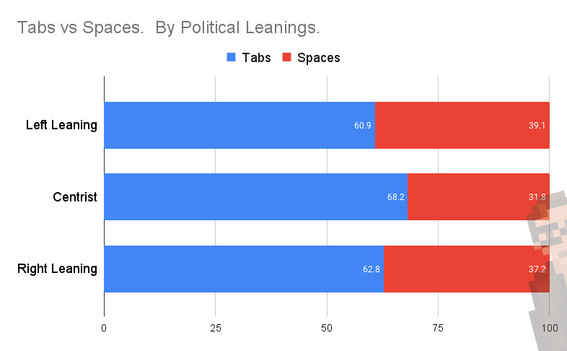
Well, look at that.
Turns out... those who identified politically as Centrists were the most likely to like Tabs! By a surprisingly large margin. Both Left and Right-leaning folks were actually not that far apart on the Tabs v Spaces issue... so... they've got that in common!
Tabs / Spaces vs Ethnicity
Ok. Now let's look at a correlation between Tabs / Spaces... and ethnicity.
I know. I know. Just asking to get yelled at. But, hey, there's no harm in looking at numbers, right?
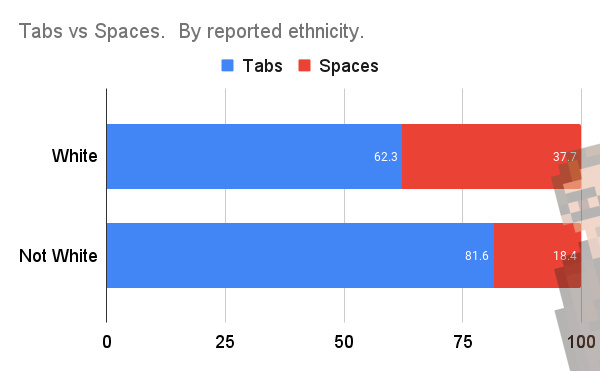
Your eyes do not deceive you.
People who identified as "White" were 62.3% in favor of Tabs. But people who identified as anything other than "White" ("Black or African", "Asian", and other options pulled directly from the US census) declared an 81.6% preference for Tabs.
Why? No clue. But the numbers are right there.
Tabs / Spaces vs Programming Language
Ok, now let's tackle the topic that many of us -- myself included -- would probably assume has the biggest influence on wether or not a person prefers Tabs or Spaces: Programming languages.
We asked people which programming languages they were sufficiently familiar with to be able to code a simple application without much assistance. Let's see how familiarity with any given programming language correlates to a choice of Tabs or Spaces.
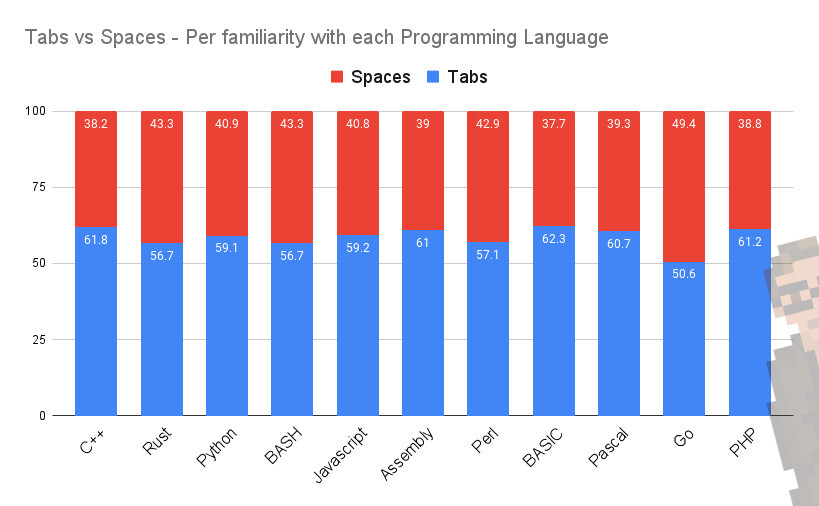
Some eyebrow raising results:
- Those familiar with the most popular languages all tended towards Tabs more than Spaces (this includes those familiar with Python).
- Go, Perl, BASH, & Rust were the four languages with the strongest tendency to vote for Spaces.
- With BASIC, C++, PHP, & Assembly tending most heavily towards Tabs.
But who are the happiest?
All of that is interesting. Weird, funky little tidbits of information.
But what about a truly important question...
Which group, on average, is happier? Those that use Tabs... or Spaces?
We asked people to rank their happines. On scale of 1 to 10. This was the result.
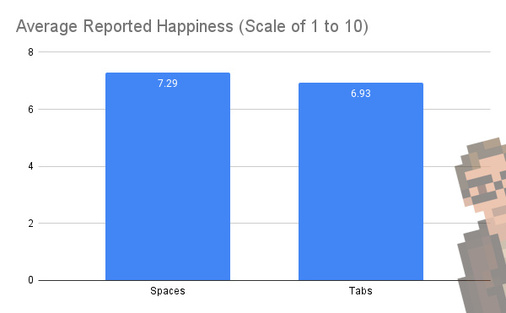
- Spaces: 7.29 / 10
- Tabs: 6.93 / 10
A difference of 0.36. Or, to put another way, Spaces users are (on average) 5.2% happier than Tabs users.
Sure. 5.2% may not seem like a lot. And there may be a lot of other possible causations -- with possible connections or relations to the Spaces / Tabs question -- which may be more likely to influence that percentage change in reported happines.
Just the same. Fascinating to think that most people (63.9%) choose Tabs.
Yet... Spaces users are happier. At least a little.
This report is derived from data obtained between February 22nd and March 10th of 2024, as part of the Great Tech Industry Demographics Survey. During this survey, 7,200 respondents (a sample size many times larger than used by most polling agencies in national elections) answered 46 questions on a wide variety of technical, political, personal, and IT work-place related topics.
The survey was distributed by a wide range of writers, podcasters, YouTubers, & tech enthusiasts -- representing a variety of computing preferences (Windows vs Mac vs Linux, etc.) and political leanings.
The full, anonymous data will be released -- to allow for additional public analysis -- following a round of initial reporting by The Lunduke Journal.
If you are not already a subscriber to The Lunduke Journal, now's a great time. At the very least, get yourself a free subscription so you don't miss out (most articles and shows here at The Lunduke Journal are free for all to enjoy).
Find more information (including RSS Podcast feeds, links to some of the big shows, how to become a whistleblower, and more) at the Lunduke Journal Link Central page.
